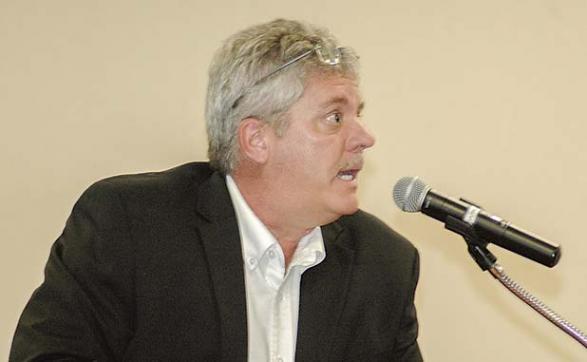The Peachtree City Council on Sept. 17 will hear a presentation directed at bringing city-owned broadband services to large industrial and commercial users and city-owned facilities. If approved and once implemented, the service will not be available for residential customers.
“This is a big decision,” said interim City Manager Jon Rorie on Sept. 8. “So is the juice worth the squeeze going forward?”
 Left, ‘Is the juice worth the squeeze?” asks interim City Manager Jon Rorie at a hearing on fiber. Photo/Ben Nelms.
Left, ‘Is the juice worth the squeeze?” asks interim City Manager Jon Rorie at a hearing on fiber. Photo/Ben Nelms.
If approved by the City Council, Peachtree City’s move to provide broadband service would require a multi-step process that would result in 22.54 miles of underground fiber cable that would serve city-owned facilities and the city’s high-end industrial and commercial businesses already using large quantities of broadband. A survey of likely large customers indicated that having the city operate the system would be economically feasible, city staff said.
Providing the needed infrastructure would require a municipal bond-funded expense of $3.23 million, said Community Broadband LLC owner Allen Davis at the Sept. 8 council workshop.
Davis said the city would see a positive cash flow in the second year of operation.
Council during the discussion was told that the initial projected 3.5 percent interest rate on the bond would likely be closer to 2 percent.
Today’s download speeds hit the 25-50 Mbps range today, whereas fiber optic attains speeds of 1 Gbps or higher, city staff said, adding that those speeds are needed by some high-end users.
Finance Director Paul Salvatore said a growing concern with fiber is that it carries no franchise fee requirement since the Federal Communication Commission maintains that broadband is an information service.
“So cable franchise fees will decrease over time as fiber increases,” Salvatore said. “We need to do something before the (current) $400,000 in (franchise fees) disappears.”
Residential customers wanting to take advantage of high-speed Internet services will be in for a very long wait. Running fiber optics to residential and smaller business customers would have to come by way of other vendors such as NuLink once the city installs the infrastructure “backbone,” staff said.
As for city-owned facilities, the bill from NuLink last year was $50,000 and is increasing to $70,000, Salvatore said.
Fayette County Development Authority Business Retention and Expansion Manager Emily Poole at the meeting said a high-speed data network would be a benefit for existing industry and would help attract additional industry to the city.
With municipal-owned broadband, the city would own the right-of-way for fiber installation and would call the shots on infrastructure rather than relying on a for-profit vendor, said staff.
Councilman Eric Imker during the discussion said he would like to see a breakdown on income, expenses and amortization covering years one through 20 at the Sept. 17 meeting.
Imker at the end of the Sept. 8 presentation also said he would like to hear from the public at the Sept. 17 meeting and consider the proposal in October. The council by consensus agreed with the suggestion.






